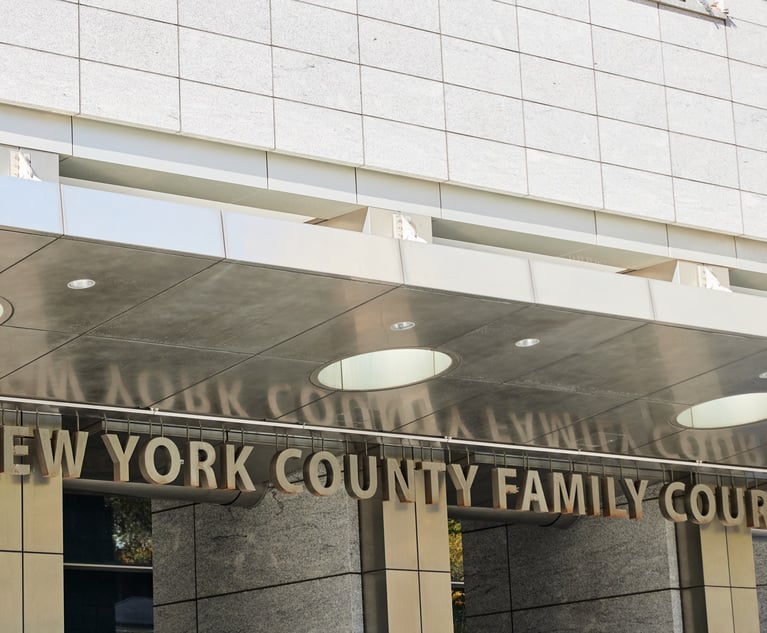Guiding Clients on Choosing a Foreign Person as Guardian for Minors
For clients considering nominating a non-domiciliary alien (NDA) as guardian, it's important to advise them on the provisions of SCPA 707(1)(c), which both declares most NDA's ineligible but also provides a mechanism for restoring eligibility through the appointment of a co-guardian.
January 28, 2022 at 02:00 PM
8 minute read
 One of the most common reasons clients engage an attorney to prepare testamentary documents is to nominate guardians of the person (hereinafter, simply "guardian") for their minor children. The issue is intuitive and obvious—who will care for my child if I am gone? But even for this basic question, an effective planner will explain the client's options, educate them on the legal framework's nuances, and work with them on drafted language that reflects their informed choices.
One of the most common reasons clients engage an attorney to prepare testamentary documents is to nominate guardians of the person (hereinafter, simply "guardian") for their minor children. The issue is intuitive and obvious—who will care for my child if I am gone? But even for this basic question, an effective planner will explain the client's options, educate them on the legal framework's nuances, and work with them on drafted language that reflects their informed choices.
For clients considering nominating a non-domiciliary alien (NDA) as guardian, it's important to advise them on the provisions of SCPA 707(1)(c), which both declares most NDA's ineligible but also provides a mechanism for restoring eligibility through the appointment of a co-guardian. Significantly, SCPA 707(1)(c) and the other bases of ineligibility listed in SCPA 707 apply to persons seeking any kind of fiduciary letters (namely, those petitioning the court to be appointed as executor, guardian, or trustee in a decedent's estate). However, this discussion is limited to letters of guardianship and to counseling clients on guardian-specific selection and drafting issues.
The Statute
SCPA 707 begins by affirmatively stating that "Letters may issue to a natural person or to a person authorized by law to be a fiduciary"—essentially, individuals and businesses that are licensed to be fiduciaries. The remainder of the provision identifies six classes of persons who are "ineligible":
This content has been archived. It is available through our partners, LexisNexis® and Bloomberg Law.
To view this content, please continue to their sites.
Not a Lexis Subscriber?
Subscribe Now
Not a Bloomberg Law Subscriber?
Subscribe Now
NOT FOR REPRINT
© 2025 ALM Global, LLC, All Rights Reserved. Request academic re-use from www.copyright.com. All other uses, submit a request to [email protected]. For more information visit Asset & Logo Licensing.
You Might Like
View All
Family Law Practitioners Weigh In on Court System's New Joint Divorce Program

'Intrusive' Parental Supervision Orders Are Illegal, NY Appeals Court Says
4 minute read
'Landmark' New York Commission Set to Study Overburdened, Under-Resourced Family Courts

Law Journal Column on Marital Residence Sales in Pending Divorces Puts 'Misplaced' Reliance on Two Cases
8 minute readTrending Stories
- 1ACC CLO Survey Waves Warning Flags for Boards
- 2States Accuse Trump of Thwarting Court's Funding Restoration Order
- 3Microsoft Becomes Latest Tech Company to Face Claims of Stealing Marketing Commissions From Influencers
- 4Coral Gables Attorney Busted for Stalking Lawyer
- 5Trump's DOJ Delays Releasing Jan. 6 FBI Agents List Under Consent Order
Who Got The Work
J. Brugh Lower of Gibbons has entered an appearance for industrial equipment supplier Devco Corporation in a pending trademark infringement lawsuit. The suit, accusing the defendant of selling knock-off Graco products, was filed Dec. 18 in New Jersey District Court by Rivkin Radler on behalf of Graco Inc. and Graco Minnesota. The case, assigned to U.S. District Judge Zahid N. Quraishi, is 3:24-cv-11294, Graco Inc. et al v. Devco Corporation.
Who Got The Work
Rebecca Maller-Stein and Kent A. Yalowitz of Arnold & Porter Kaye Scholer have entered their appearances for Hanaco Venture Capital and its executives, Lior Prosor and David Frankel, in a pending securities lawsuit. The action, filed on Dec. 24 in New York Southern District Court by Zell, Aron & Co. on behalf of Goldeneye Advisors, accuses the defendants of negligently and fraudulently managing the plaintiff's $1 million investment. The case, assigned to U.S. District Judge Vernon S. Broderick, is 1:24-cv-09918, Goldeneye Advisors, LLC v. Hanaco Venture Capital, Ltd. et al.
Who Got The Work
Attorneys from A&O Shearman has stepped in as defense counsel for Toronto-Dominion Bank and other defendants in a pending securities class action. The suit, filed Dec. 11 in New York Southern District Court by Bleichmar Fonti & Auld, accuses the defendants of concealing the bank's 'pervasive' deficiencies in regards to its compliance with the Bank Secrecy Act and the quality of its anti-money laundering controls. The case, assigned to U.S. District Judge Arun Subramanian, is 1:24-cv-09445, Gonzalez v. The Toronto-Dominion Bank et al.
Who Got The Work
Crown Castle International, a Pennsylvania company providing shared communications infrastructure, has turned to Luke D. Wolf of Gordon Rees Scully Mansukhani to fend off a pending breach-of-contract lawsuit. The court action, filed Nov. 25 in Michigan Eastern District Court by Hooper Hathaway PC on behalf of The Town Residences LLC, accuses Crown Castle of failing to transfer approximately $30,000 in utility payments from T-Mobile in breach of a roof-top lease and assignment agreement. The case, assigned to U.S. District Judge Susan K. Declercq, is 2:24-cv-13131, The Town Residences LLC v. T-Mobile US, Inc. et al.
Who Got The Work
Wilfred P. Coronato and Daniel M. Schwartz of McCarter & English have stepped in as defense counsel to Electrolux Home Products Inc. in a pending product liability lawsuit. The court action, filed Nov. 26 in New York Eastern District Court by Poulos Lopiccolo PC and Nagel Rice LLP on behalf of David Stern, alleges that the defendant's refrigerators’ drawers and shelving repeatedly break and fall apart within months after purchase. The case, assigned to U.S. District Judge Joan M. Azrack, is 2:24-cv-08204, Stern v. Electrolux Home Products, Inc.
Featured Firms
Law Offices of Gary Martin Hays & Associates, P.C.
(470) 294-1674
Law Offices of Mark E. Salomone
(857) 444-6468
Smith & Hassler
(713) 739-1250






